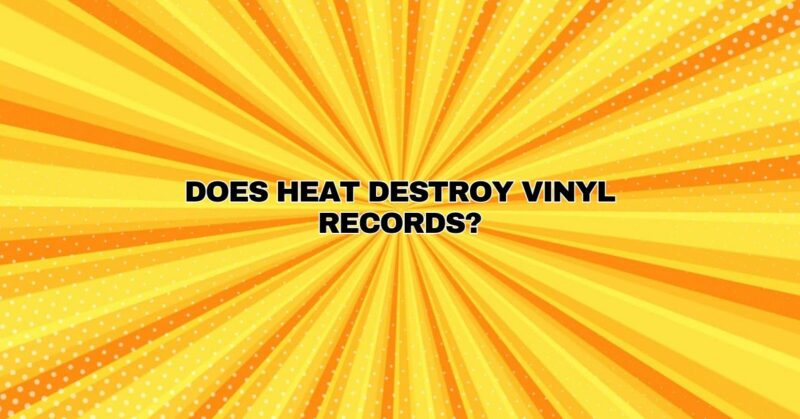Vinyl records, cherished for their analog warmth and nostalgic appeal, have remained a beloved medium for music enthusiasts across generations. As vinyl collectors continue to seek and expand their collections, the question of whether heat destroys vinyl records often arises. In this article, we will explore the relationship between heat and vinyl records, the potential risks involved, and the best practices for safeguarding your cherished vinyl collection from the ravages of excessive heat.
Understanding Vinyl Record Composition
To comprehend the potential impact of heat on vinyl records, it is essential to understand the composition of these musical treasures. Vinyl records are primarily constructed from polyvinyl chloride (PVC), a durable and resilient plastic material. While PVC is known for its resistance to physical damage, it is not impervious to environmental factors, including heat.
The Impact of Heat on Vinyl Records
Heat can indeed have detrimental effects on vinyl records. Here’s a closer look at how excessive heat can affect these cherished musical artifacts:
- Warping: One of the most common and noticeable consequences of heat exposure is record warping. Heat softens the PVC material, causing records to warp or curl. Warped records are no longer flat and cannot track properly on a turntable, leading to tracking issues and audio distortion.
- Groove Distortion: Excessive heat can lead to groove distortion, affecting the shape and depth of the grooves on the record’s surface. Groove distortion can result in playback problems, including skips and jumps.
- Increased Susceptibility to Damage: Heat-damaged records are more susceptible to physical damage, such as cracks, fractures, and chipping. These types of damage can render a record unplayable.
- Label Peeling: Prolonged exposure to heat can cause the adhesive holding the record label to deteriorate, leading to label peeling or detachment.
- Vinyl Softening: In extreme cases, heat can soften the vinyl material to the point where it becomes sticky and difficult to handle.
Factors Influencing the Impact of Heat
The severity of heat damage to vinyl records can vary based on several factors, including:
- Temperature Levels: The temperature to which records are exposed plays a crucial role. While PVC has a relatively high melting point, sustained exposure to temperatures above 140°F (60°C) can lead to warping and distortion.
- Duration of Exposure: The longer records are exposed to high temperatures, the more likely they are to suffer damage. Short-term exposure may cause minimal harm, while extended exposure can result in irreversible damage.
- Record Storage: Proper record storage is essential. Records stored in a cool, temperature-controlled environment are less vulnerable to heat-related damage.
- Quality of Vinyl: The quality of the vinyl pressing can also influence its resistance to heat damage. High-quality pressings with well-defined grooves may be more resilient.
Best Practices for Protecting Vinyl Records from Heat
To safeguard your vinyl collection from the potential destructive effects of heat, consider the following best practices:
- Controlled Storage Environment: Store your vinyl records in a cool, dry, and temperature-controlled environment. Avoid areas prone to temperature fluctuations or excessive heat, such as attics, garages, and basements.
- Avoid Direct Sunlight: Keep records away from direct sunlight, as heat generated by sunlight can significantly increase the temperature in the storage area.
- Use Proper Shelving: Invest in sturdy, level record storage shelves that provide even support for your collection.
- Limit Exposure: Minimize the time your records spend outside their protective sleeves and storage environment. Return records to their sleeves promptly after playback.
- Heat-Resistant Outer Sleeves: Consider using heat-resistant outer sleeves to protect your records from heat and UV radiation when they are not in their storage sleeves.
Conclusion
While vinyl records are known for their durability, they are not impervious to the effects of heat. Excessive heat can lead to warping, groove distortion, and physical damage, ultimately affecting playback quality and the longevity of your cherished vinyl collection.
To ensure that your vinyl records stand the test of time, it is essential to store them in a controlled environment with proper temperature and humidity levels. By adhering to best practices for vinyl record storage and handling, you can enjoy your collection for years to come, free from the risks associated with heat exposure.


